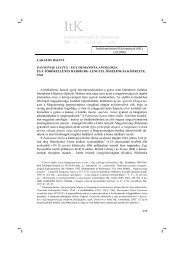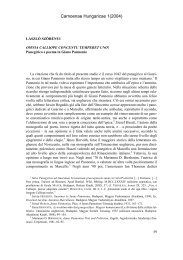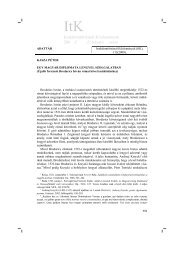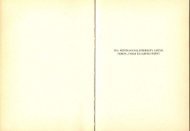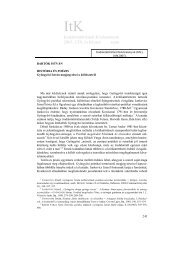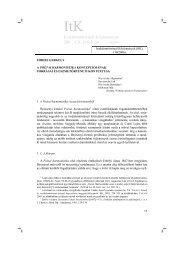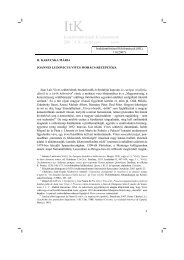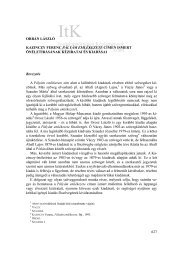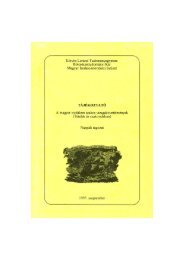Camoenae Hungaricae 3(2006) - Irodalomtörténeti Közlemények
Camoenae Hungaricae 3(2006) - Irodalomtörténeti Közlemények
Camoenae Hungaricae 3(2006) - Irodalomtörténeti Közlemények
You also want an ePaper? Increase the reach of your titles
YUMPU automatically turns print PDFs into web optimized ePapers that Google loves.
<strong>Camoenae</strong> <strong>Hungaricae</strong> 3(<strong>2006</strong>)<br />
away from extremities and he only progressed as far as adopting the position of duplex<br />
veritas: as a politician and a diplomat serving the Habsburgs, he continued to think of the<br />
Carpathian Basin and the Balkans as belonging under the legal administration of Regnum<br />
Hungaricum, but as a scholar, Vitezović’s Illyria (or Croatia) project might have been<br />
more fertile a ground for him. During his border survey activities, he reheated the decade-old<br />
idea of Fragmenta, a publication of a great collection of Balkan source materials,<br />
and included a new “group of sources” among those to be explored. As he wrote in<br />
his 1721 report cited before, “In the course of my travels of the border regions I realised<br />
that a work containing many centuries of the history of Illyria could be compiled by producing<br />
a collection of old Illyrian songs, more precisely the old historical songs that one<br />
may hear sung by blind bards and the new songs they also produce. I have been greatly<br />
impressed by the graceful dexterity this nation demonstrated in this and by the fact that<br />
blind minstrels living near the borders, upon being advised of the debate between myself<br />
and the Turks, would week to week prepare these songs in their own poetic metres then<br />
come to sing them before my tents and the tents of the Turks, sometimes accompanying<br />
them by dancing. Cavaliere Ritter who versifies in both Latin and Illyrian has confirmed<br />
this conviction of mine, showing me a book containing a collection of historical songs,<br />
which describe many historical events which have been lost due to the lack of writers or<br />
preserved writings and are remembered solely by the blind bards who hand them down to<br />
their blind offspring. Now that the imperial troops captured most of Serbia and Wallachia,<br />
I can realise my plans to benefit of our modern literature and collect and publish all<br />
these fragments—especially those which bring us news of the countries which have been<br />
excluded for centuries from communicating with our learned nations.” 70<br />
The current location of the book, containing the historical songs and naïve epic fragments<br />
on which Vitezović was relying, remains unknown. Researching this would be an<br />
interesting task for literary historians, but for the purposes of the present research we<br />
must make do with the currently available documents, from which one significant conclusion<br />
can certainly be drawn. The second great layer of the Marsili papers, those produced<br />
70 “Nell’occasione prementoata dei miei viaggi Limitanei m’occorse d’imparare che era possibile unire una<br />
Storia dell’Illirico da più secoli, unendo una Raccolta delle Canzoni, ò Cantilene illiriche antiche, che da<br />
Ciechi s’imparano, e d’altre nuove, che si compongono da loro, e di questa facilità naturale di tal Nazione ne<br />
restai persuaso, et che di settimana in settimana li Ciechi circonvicini a i Limiti informandosi de i Contrasti, e<br />
successi frà Turchi, e me facevano col loro metro composizioni in Illirico, che venivano di poi a cantare avanti<br />
le mie Tende, e de’ Turchi accompagnando tutto con suono, ed anche alle volte con Danze. Il Cavagliere Riter<br />
Poeta Latino, ed Illirico mi confermò questa Verità, mostrandomi in un Libro una numerosissima Raccolta di<br />
tali Cantilene, che davano tante notizie istoriche, che per mancanza di scrittori, o della conservazione de scritti<br />
antichi s’erano perdute, e solo conservate per questo mezzo de Ciechi che le lasciarono a i successori privi<br />
della Vista. In ora che l’armi di Cesare hanno occupato una gran parte della Servia e Vallachia potrà esere<br />
ridotto a perfezione questo mio Abbozzo in vantaggio della nostra moderna Letteratura tutta intenta a raccogliere,<br />
e pubblicare sifatti fragmenti, e massime che ci danno notizie di paesi, che da più secoli sono stati<br />
senza commercio con le nostre Nazioni colte, ma per il decantato tenore impressoli da Turchi, veruno ardì<br />
nemeno pensarvi.” Lettera di prefazione, 185–186. Marsili, writing about the rulers of Bosnia, makes a note<br />
of the significance of oral epics in the sustenance of historical memory in the Monarchia Ungarica: BUB Ms<br />
28 (Ad tabulam genealogicam regum Bosnae apodixis), 27.<br />
131



